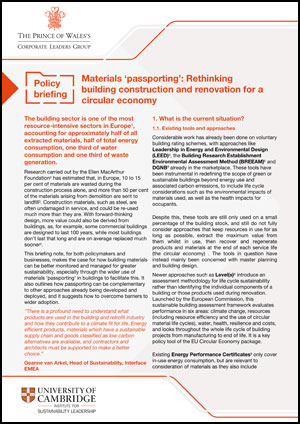June 2018 – The building sector is one of the most resource-intensive sectors in Europe, accounting for approximately half of all extracted materials and half of total energy consumption. This briefing note for policymakers and businesses makes the case for how building materials can be better monitored and managed for greater sustainability, especially through the wider use of materials ‘passporting’ in buildings to facilitate this.
Research carried out by the Ellen MacArthur Foundation has estimated that, in Europe, 10 to 15 per cent of materials are wasted during the construction process alone, and more than 50 per cent of the materials arising from demolition are sent to landfill. Construction materials, such as steel, are often undamaged in service, and could be re-used much more than they are. With forward-thinking design, more value could also be derived from buildings, as, for example, some commercial buildings are designed to last 100 years, while most buildings don’t last that long and are on average replaced much sooner.
More and more businesses are identifying the huge potential for approaches to address waste problems, improve energy efficiency and generally contribute to business sustainability. Some CLG companies whose products or materials are used in building construction and renovation support taking a longer-term view, to avoid increasing the carbon footprint of the building through use of carbon-intensive materials or products, to monitor toxicity levels, or to not add to the waste stream when the building is renovated again in future.
This policy briefing makes the case for how building materials can be better monitored and managed for greater sustainability, especially through the wider use of materials ‘passporting’ in buildings to facilitate this. It also outlines how passporting can be complementary to other approaches already being developed and deployed, and it suggests how to overcome barriers to wider adoption.
Citing this briefing
Please refer to this publication as University of Cambridge Institute for Sustainability Leadership (CISL). (2018). Policy briefing: Materials ‘passporting’: Rethinking building construction and renovation for a circular economy, Cambridge, UK: The Prince of Wales’s Corporate Leaders Group.





